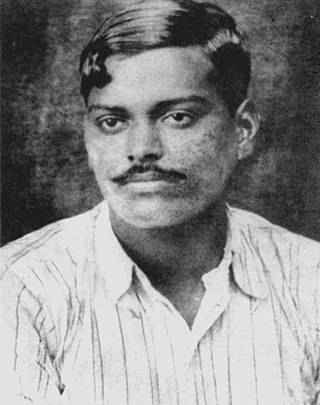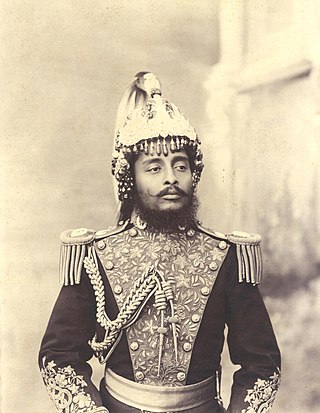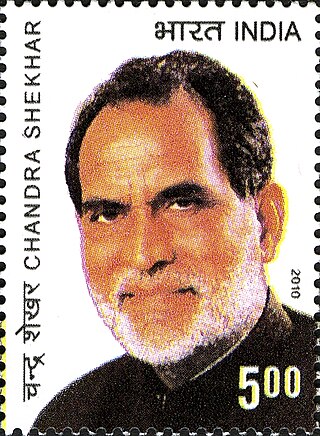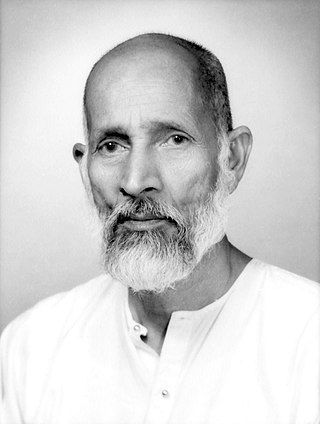Related Research Articles

Janata Dal was an Indian political party which was formed through the merger of Janata Party factions, the Lok Dal, Indian National Congress (Jagjivan), and the Jan Morcha united on 11 October 1988 on the birth anniversary of Jayaprakash Narayan under the leadership of V. P. Singh.

Ram Vilas Paswan was an Indian politician from Bihar and the Cabinet Minister of Consumer Affairs, Food and Public Distribution in the first and second Modi ministries. Paswan was also the president of the Lok Janshakti Party, nine-times Lok Sabha member and two-time Rajya Sabha MP. He started his political career as member of Samyukta Socialist Party and was elected to the Bihar Legislative Assembly in 1969. Later, Paswan joined Lok Dal upon its formation in 1974, and became its general secretary. He opposed the emergency, and was arrested during this period. He first entered the Lok Sabha in 1977, as a Janata Party member from Hajipur constituency, and was elected again in 1980, 1989, 1991, 1996, 1998, 1999, 2004 and 2014.

Bipin Chandra Pal was an Indian nationalist, writer, orator, social reformer and Indian independence movement freedom fighter. He was one third of the "Lal Bal Pal" trio. He was one of the main architects of the Swadeshi movement. He is known as the Father of Revolutionary Thoughts in India. He also opposed the partition of Bengal by the British colonial government.
Brahmo Samaj is the societal component of Brahmoism, which began as a monotheistic reformist movement that appeared during the Bengal Renaissance.

Chandra Shekhar Sitaram Tiwari, popularly known as Chandra Shekhar Azad, was an Indian revolutionary who reorganised the Hindustan Republican Association (HRA) under its new name of Hindustan Socialist Republican Association (HSRA) after the death of its founder, Ram Prasad Bismil, and three other prominent party leaders, Roshan Singh, Rajendra Nath Lahiri and Ashfaqulla Khan. He hailed from Bardarka village in Unnao district of United Provinces and his parents were Sitaram Tiwari and Jagrani Devi. He often used the pseudonym "Balraj" while signing pamphlets issued as the commander-in-chief of the HSRA.

Jagjivan Ram, known popularly as Babuji, was an Indian independence activist and politician from Bihar. He was instrumental in the foundation of the All India Depressed Classes League, an organisation dedicated to attaining equality for untouchables, in 1935 and was elected to Bihar Legislative Assembly in 1937, after which he organised the rural labour movement.
Fatehgarh is a cantonment town in Farrukhabad district in the state of Uttar Pradesh, India. It is located on the south bank of the Ganges River. It is the administrative headquarters of Farrukhabad District. Fatehgarh derives its name from an old fort. It is a small city with no significant industrial activity. Asia's largest potato market is located in Farrukhabad. It contains a large Indian Army establishment in the form of The Rajput Regimental Centre, 114 Infantry Battalion TA and The Sikh Light Infantry Center.
The Hindu–German Conspiracy Trial commenced in the District Court in San Francisco on November 12, 1917, following the uncovering of the Hindu–German Conspiracy for initiating a revolt in India. It was part of a wave of such incidents which took place in the United States after America's entrance into World War I. The trials came after pressure from the United Kingdom to suppress the Indian independence movement abroad.

The Battle of Haldighati was a battle fought on 18 June 1576 between the Mewar forces led by Maharana Pratap, and the Mughal forces led by Man Singh I of Amber. The Mughals carried the day after inflicting significant casualties on Mewar forces, although they failed to capture Pratap, who reluctantly retreated persuaded by his fellow commanders.

The Kakori Train robbery was a train robbery that took place at Kakori, a village near Lucknow, on 8 August 1925, during the Indian independence movement against the British rule in India. It was organized by the Indian revolutionaries of Hindustan Republican Association (HRA).

Field-Marshal His Highness Maharaja Sri Teen Chandra Shumsher Jung Bahadur Rana was the Prime Minister of Nepal from the Rana dynasty. He served in this capacity from 27 June 1901 to his death in 1929 after he successfully deposed his liberal and reformist brother Dev Shamsher. Although generally perceived as despotic and conservative, he is credited with several reforms including the abolition of slavery and establishing the Nepal-Britain Treaty of 1923, which recognised Nepal as an independent nation and an ally of Britain.

Ram Chandra Bharadwaj, also known as Pandit Ram Chandra was the president of the Ghadar Party between 1914 and 1917. As a member of the Ghadar Party, Ram Chandra was also one of the founding editors of the Hindustan Ghadar and a key leader of the party in its role in the Indo-German Conspiracy. He assumed the role of the president of the party following Lala Har Dayal's departure for Switzerland in 1914 and, along with Bhagwan Singh and Maulvi Mohammed Barkatullah, was key in rallying the support of the South Asian community in the Pacific Coast in the wake of the Komagata Maru incident for the planned February mutiny. Ram Chandra was assassinated on 24 April 1918 on the last day of the Hindu–German Conspiracy Trial by Ram Singh, a fellow defendant who believed that Ram Chandra was a British agent.
Sahaj Marg or Heartfulness Meditation is a set of meditative practices first developed at the turn of the twentieth century and formalized into teaching through Shri Ram Chandra Mission in 1945. It is a form of Raja Yoga meditation system. Use of pranahuti or yogic transmission and the cleaning of impressions are claimed to be unique to this method.

Chandra Shekhar was an Indian politician who served as the 8th Prime Minister of India, between 10 November 1990 and 21 June 1991. He headed a minority government of a breakaway faction of the Janata Dal with outside support from the Indian National Congress. He was the first Indian Prime Minister who had never held any prior government office.

Shri Ram Chandra Mission (SRCM) is a non-profit organization and a spiritual movement originating in India, which teaches the practice of "Sahaj Marg" or "Heartfulness Meditation". It was registered in 1945 by Ram Chandra of Shahjahanpur, Uttar Pradesh. It has its current headquarters at Kanha Shanti Vanam, Kanha village, Ranga Reddy District near Hyderabad, Telangana.
Prof. Ram Raj Pant (1920–1993) was a pioneering linguist of the Nepali language, literary writer and promoter of legal education in Nepal. In addition to publishing multiple volumes on Nepali linguistics, Ram Raj Pant led the establishment of Nepal Law College and was its founding Principal. Nepal Law College later became Nepal Law Campus under the Tribhuvan University.

Ram Chandra Datta was a householder disciple of Ramakrishna and a writer. Datta was a relative of Indian monk and social reformer Swami Vivekananda. After completing his graduation, he took job of a Government employee and a chemist. He invented an antidote for blood dysentery from an extract of an indigenous medicinal plant and started promoting "modern science".
Kaptanganj is a constituency of the Uttar Pradesh Legislative Assembly covering the city of Kaptanganj in the Basti district of Uttar Pradesh, India.

Ram Chandra of Shahjahanpur (1899-1983), also known as Babuji, was a yogi from Uttar Pradesh in northern India. He spent most of his life developing a method of Raja Yoga meditation called Sahaj Marg. He founded an organization called Shri Ram Chandra Mission in 1945, dedicated and named after his teacher, who was also called Ram Chandra.
References
- ↑ Chandra, Ram. Commentary on the Ten Maxims of Sahaj Marg. The Heartfulness Store. ISBN 978-93-88095-61-7.